Home
Up
MTV Mexico
Bravo magazine 6
She
Aktüel
Télé Club Plus 2
Bravo magazine 5
Télé Club Plus
Turkish newspapers
Istanbul concert
Bravo magazine 4
Bravo magazine 3
Bravo magazine 2
Football game
Telephone call
Hit magazine
Paul de Leeuw
World Music Awards
Bravo magazine 1
German radio
| |
|
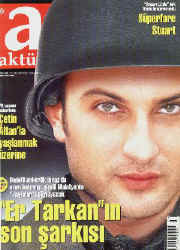
Turkish Magazine Aktüel,
January 2000 |
The
new
substituted
military service a little for his benefit; now in Malatya he will sing
“Yaylalar”
PRIVATE
TARKAN’S LAST SONG |
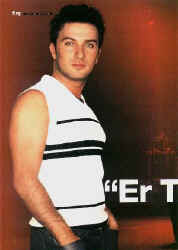 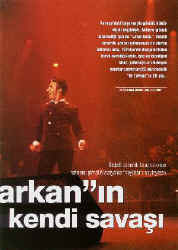
|
The
new substituted military service a little for his benefit; now in
Malatya he will sing “Yaylalar”
PRIVATE
TARKAN’S PRIVATE WAR
|
With
his successes in Europe, he was seen as a voluntary ambassador of
culture. With his reluctance to enter the army, as a “traitor to his
country”. It is uncertain what would have happened had not the
substituted military service law come into force, but it is certain that
he shook one of Turkey’s standing foundations. Here, a person who
knows what he wants, forcing the boundaries with his talent and
intelligence, the 28 day military service of paying soldier Private
Tarkan’s 28 years... |
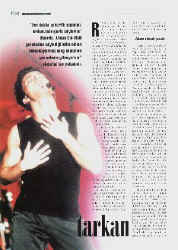 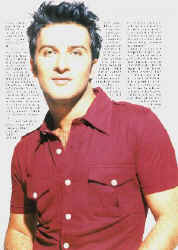
|
“I
won’t do my military service in the mountains, I’ll sing in the army
camp”
he
was quoted as saying. However, he branded the claim that he had told the
German newspaper Die Welt “It’s
because I don’t wish to fire upon my fellow citizens that I refuse to
go into the army”
as false.
Had not his
dear departed father Ali Tevetoðlu believed that he would be unable to
control his six children upon foreign soil and made the decision to
permanently return to Turkey, it is possible that Tarkan would still be
living with the resentment of his name, taken from a historic comic hero
who traveled with his pet wolf making things difficult for the Byzantines.
Interested in music from an early age, his talent made him conspicuous
in school corridors. With his voice and physique, wherever he happened
to be in the world and with a helping hand from lady luck, he may
have found fame; “the Turk who gained
success away from home” may have made our hearts swell with
pride. However, it is certain that living |
in
Germany would not have won him the body language that has turned him
into an idol. They would have found his
dances strange, opening his knees and splaying his legs out sideways; he
would not have reached that mass of infatuated girls ready to faint over
his “I’ll consume
you” message, while shaking his head and biting his bottom lip with
desire.
It is possible that a more stable life was awaiting Tarkan.
His mature voice and good looks may have achieved him a career on a more
moderate wave, one that would have made his bank account swell as his
temple hairs grayed. But, the young girls aside, managing to “enslave
everyone*”since
his first album, by giving his shirts to the wind, renewing the face of charisma
with his “kiss kiss” and his Casanova looks and opening sail to new
horizons, would have been difficult.
He
succeeded. Capturing George Michael’s manner with “Þýkýdým”,
he decorated his American dreams. Finally with “Þýmarýk”, he
didn’t stop at breaking records in Turkey, he made Europe accept him.
The growing of those “enslaved” by him was the natural result of a
glittering career fitted into his 27 years.
*
referring to the song “kýl oldum” (brother, I've become her slave) |
|
|
The
boy who would be man
Tarkan
Tevetoðlu, being the fifth child of a family of six, came into the
world on the 17th October 1972 in Alzey, near Frankfurt, Germany. His
adventure began while he was still in his mother’s womb. His mother,
Neþe Haným, while pregnant to him, suffered a car accident and lay
comatose for a month. As was the procedure, the doctors advised for an
abortion. However, after Ali Bey had in a dream seen his son “born
healthy and furthermore with a star shining over his head,” he was not
likely to agree. The Tevetoðlu couple were to leave the hospital, after
signing a document accepting all economic responsibility of the child in
the event it was born physically or mentally challenged.
According
to his mother, when Tarkan was born he was screaming so beautifully that
even the mid-wife could not help but express: “I
bet one day he’s going to become a singer.”
Every baby that kicks in the womb is often described as a potential
footballer, yet it was apparent to friend and foe alike that his voice
was stunning. By mutual consent a decision was made for Tarkan to be
given music lessons. However, the training was not to be of the
“Fame” variety, as Tarkan himself would imagine. Spurred on by the
dream of a large house with gardens, |
his
father made the permanent return to Turkey and along with middle school,
Tarkan began lessons on note, solfége and singing.
The sudden change in his life might have been enough for
Tarkan to retire indoors, but it wasn’t enough for him to retire
within himself. Quite the opposite, at home he had commenced singing out
loud with ardor, the newly learnt Turkish Classical Music pieces,
possibly as a way to disperse his melancholia. Most of the neighbors
would put up with this. They treated Tarkan with understanding. Who
knows, may be they were feeling the pleasure of being witnesses to a new
star being
born?
But not everybody was of the same opinion. In those years, a student of
ÝTÜ (Istanbul
Technical University), a neighbor's son Ersan Yýlmaz, was one such
person who could not concentrate because of Tarkan...
“Tarkan resided in the neighboring house to my
family’s house. Whenever I would come to Karamürsel, I would find it
difficult to study because Tarkan would be continuously listening and
singing to Turkish Classical pieces. He would especially listen to
Bülent Ersoy and Zeki Müren. By singing along may be he was trying to
capture their style. But this way or that, there was always the sound of
Turkish Classical Music in our house. I was finding it very difficult to
study under such conditions. Besides that, I enjoy listening to rock
music.” |
|
|
|
Tarkan not only stamped out his personality at home, but he also made
his presence felt at school. With the school principal’s permission,
he became the star of many a school event and charity night. And not
only of the night, he became a star during lesson time, too. Esra Soydan
describes him as a colorful character: “He attracted a lot of
attention at school; amongst his admirers, there were also fanatics that
would wait for him outside the school. He was an ardent follower of
fashion. He was always dressed suitably and stylishly. During physical
exercises at school, it would be possible to see him in a tracksuit that
would become fashionable later on. He had a very enterprising
personality. I’m not a bit surprised that he has achieved all he
has.” |
At this stage he had already begun to earn a little from music. At the
Çýnarcýk tea gardens he had secured a following out of bored wealthy
housewives. He began to procure pocket money from this venture. His real
ambition, however, was to read Graphic Arts* at the Mimar Sinan
University. Upon this aim, he came to Ýstanbul. With two other friends
he rented a house in Beþiktaþ and began to live in the metropolis. He
failed to pass the exams, but had fallen captive to Ýstanbul’s lure.
Though to be able to acquire some money, he would still journey to Çýnarcýk
in the Summer and, as he would later confess, be forced to sing those
Turkish Classical Music songs that he couldn’t even stand to listen
to. |
|
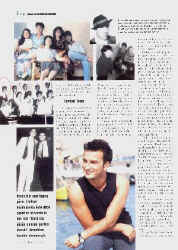 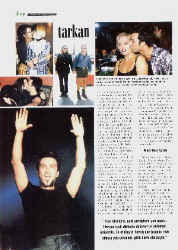
Tarkan,
a member of a family of 6, due to his father Ali coming to Turkey with
dreams of a house with gardens, found himself within a life surrounded
by Turkish Classical Music. His friends were all certain that he would
go places.
|
Tarkan
Team
Finding
himself at a crossroads, Tarkan finally realized that he had to make a
decision. Deprived of his brothers’ and sisters’ words and music and
their praise, he knew that he was without outside aid for him to achieve
any success with his singing. He decided to go to Germany to study, to
one of his four siblings that lived there. While preparing for the
journey, his closest friend from Karamürsel, Alpay Aydýn, changed his
mind. In Unkapaný, at ÝMÇ – the heart of the music industry – he
introduced him to Mehmet Söðütoðlu, one of Ýstanbul Plak’s
partners.
Söðütoðlu at the beginning of the ‘90’s was still a
young man. He had nothing much to lose. In short, in that lively era
where pop had recently exploded back on to the music scene and where
young girls were searching for their own idols, even with a unsuccessful
album a profit could be made from it’s sale, which in those days only
cost 70-80 million lira to produce. |
Hit songs were not purchased for Tarkan. It was more
of a do-it-yourself affair, with Tarkan finding or composing the music
and Alpay writing the songwords. In 8 months, they managed to prepare 15
songs together. Alpay, Mehmet and Tarkan had an amusing time sitting
down and penning Turkish words on to a few foreign songs.
However, when it hit the music scene in December 1992, and his album
“Yine Sensiz” and especially his song “Kýl Oldum Abi” became a
hit, reaching sales of around 700,000 copies, things were taken more
seriously. Tarkan’s German dream died in an instant. Slowly, his fans
began to accumulate around him. He was going to explain his bewilderment
at such developments thus: “First they would call the music company.
Then they would call my house in Beþiktaþ. One time one girl came to
the front door of my house, wrote “Tarkan I love you” on it and
left.” |
|
|
He had found fame true enough, but it still could not be said that he
had made any money. Four months after the album had been released, to
tap into the crazy fan potential, they began to throw forward certain
ideas, one being the “Tarkan Fan Club.” In those days, becoming
friends after guesting on her radio show, Romina from Best FM, Alpay,
who had become known as his manager, Mehmet Söðütoðlu and Tarkan,
began to “brain storm” over possible directions and ideas, upon the
growing Tarkan myth. There was also a name for this close knit group:
Tarkan Team.
“Upon the stage, he is one of the very few who has the
capability to do the show in the most right and aesthetic way. It may
sound like flattery, but this is what I truly think. If you look at the
music industry at this moment and compare Tarkan with anyone else, the
difference speaks for itself. His sparkle and shine are all out in the
open.”
However,
the sparkle that Romina spoke of was going to be the cause of unwanted
burdens for Tarkan. Those of the male population that would frequent his
concerts had either |
followed
their girlfriends or had come out of a “who is this 'sorry man' whom
they say is more handsome than me?” curiosity. Thus, the gossip
surrounding Tarkan was quick to ignite. There were going to be those
people, in trying to break the young girls’ desires, whom were to
classify him as, in one of the more polite terms, “Turkey’s answer
to Boy George.” Furthermore, because of his naturally mascara-lined
eyes and his fainting looks, the comparisons they had seen fit to label
him with had begun to take hold. May be if Tarkan had reputed the rumors
in an indignant manner, things may have evolved differently. However,
making anti-macho statements such as explaining that he wasn’t gay but
sexual preferences were private matters, only served to fuel the
gossips’ fire. It did not help matters when Alpay Aydýn, whom he had quarreled
with, spoke to the paparazzi newspaper Hafta Sonu stating that he “had
slept with Tarkan.” It was the icing on the cake. Ultimately, no one
could save him from being national gossip fodder, not even when, at the
risk of driving his fan base hysterical, he was constantly in the media
spotlight with such lovers as Jülyet or Elif Daðdeviren. |
|
|
|
When one looks back on such events, one cannot help but admire
Tarkan’s iron nerve. In May 1994, he recaptured success, after a slump
in album sales caused by the rumors, with “A-acayipsin” – a Sezen
Aksu supported album. He was to be grounded again, however, by his “I
need to piss” statement *,
made on live television* Tarkan's response
in a live TV show when the interviewer asked him how he was doing.
While his fan base was growing on the one side, a wave of hatred against
him was rising on the other... Even if these events were not enough to
drive a person to withdraw from the public eye, it would at least force
them to take a step back. Not so Tarkan. Instead, he expanded his dreams
and ambitions; the wounds he had incurred as a result of his words and
actions, he decided he would heal, by growing up. |
American
dream
His
new manager was Ahmet San. In 1995, together with San and Ahmet Ertegün,
at the Atlantic Records main office in New York, they met to sign a
contract. The press was informed that an English album was to be
prepared and cut. Thus began Tarkan’s American dream.
“He
was very open to new ideas, to new opnions. He would listen very
carefully to everything. He wanted to understand everything. His most
alluring attribute was the fact that he loved to take a risk in
anything, that he was a wild thing.” |
|
When
the album “Yine
Sensiz” and especially his song “Kýl Oldum Abi” sold
copies of around 700,000,
things were taken more seriously. Tarkan’s German dream died in an
instant. Slowly, his fans began to accumulate around
him
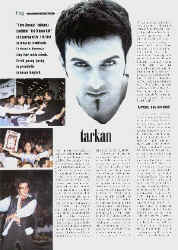 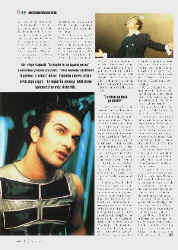
In
one report, he did not shy away from stating that “Ertegün and I
cannot come to an agreement. I say Mediterranean
motifs, he says “No”. Pretty soon I’m going to tell them that
enough is enough.” However, Ertegün’s excuse to terminate the
project was already prepared
: Military Service. |
|
However, this undertaking was not seen as an enterprising move by Tarkan,
but merely as a project to help him escape from Turkey. He found solace
in changing his environment and giving himself to his work. In
describing those days, Pakize Barýþta spoke thus: “I got to know
Tarkan during the time the media were giving
him a headache. Sezen Aksu came to our house with Tarkan one day and
said, “They’ve upset the kid. He’s feeling kind of lonely right
now. Let’s talk
a bit, it’ll do him good.” After that day, Tarkan became a frequent
visitor to our house. He became friendly with my friends and I. In this
way he entered an environment consisting of writers, |
scientists
and people in the advertising business. I believe it was a different
atmosphere than he was used to. But Tarkan has the intelligence and gut
instinct that allows him to quickly adapt to his surroundings. He was
very open to new ideas, to new opinions. He would listen very
carefully to everything. He wanted to understand everything. His most
alluring attribute was the fact that he loved to take a risk in
anything, that he was a wild thing. His grand ambitions and the projects
he planned for himself may have seemed laughable
at the time, but looking back I see now that they were nothing of that
kind.” |
|
|
|
In spite of all his positive thoughts, Tarkan’s rise was not that
easy. Close to a year after
the agreement at Atlantic, speaking to the press in Bodrum, Ahmet Ertegün
randomly expressed the difficulties of making a foreigner acceptable to
the USA market and of finding him a suitable song. A year after this
gathering, upon expressing that “Ahmet San destroyed my American
dream”, Tarkan broke all ties with his manager. The story was that he
had signed the agreement that San had prepared without reading it, he
had become a prisoner to it. Furthermore, Ahmet San’s reaction did not
fall far from his first manager Alpay’s reaction. He explained that,
with the help of some important friends, he had extended Tarkan’s
leave for military service, and thus by insinuating that he was in
effect a deserter, sowed the seeds of an argument that has reached
through to today. |
During this time, the experience of his American dream slowly
beginning to slip through his fingers, it’s extension did not seem to
bother Tarkan to a great degree. He had greatly furthered his English,
by studying at Baruch College in New York for nigh on two years, and as
a Turkish pop star living in America, he made thousands from such
advertising contracts as Doritos Panço and Police eyeglasses. Even
though “A-acayipsin’s” sales in Turkey had remained at 2,000,000,
for the album to reach sales of 700, 000 in Europe was an event never
before experienced by a Turkish pop star. This injected him with
courage. In one report, he did not shy away from stating that “Ertegün
and I cannot come to an agreement. I say Mediterranean
motifs, he says “No”. Pretty soon I’m going to tell them that
enough is enough.” However, Ertegün’s excuse to terminate the
project was already prepared
: Military Service. |
|
Europe,
hear our voice!
His
third album “Ölürüm Sana”, distributed in July 1997, sold three
million copies in Turkey alone. Straight after its release, Tarkan, who
could easily play to sell-out concerts in such cities as London, Paris
and Berlin, was promising a future in the European market. One of the
world’s biggest firms, Polgram, was quick to recognize this jewel. In
addition, they had no problem with the language barrier. For the French,
who had danced to Algerian/Tunisian singer Rai, did not care whether the
song words were in Turkish or Chinese; they were enthused by dance and
rhythm. According to Þevket Gözalan, Polgram’s European Deputy
President, it was Alain Veille, the Head of Polgram’s French Branch
Podis, who took up the cause. Without wasting any time Veille introduced
“Ölürüm Sana”’s hit song “Þýmarýk” to the market, and he
was soon to receive a result. In France “Þýmarik” reached third
place, in Belgium it captured first place. In reply to this, the company
opened the artist’s way by distributing a compilation album entitled
“Tarkan”, which contained pieces from his “Ölürüm Sana” and
“A-acayipsin” albums. Tarkan had now definitely broken away
|
from
the Rai segment of the French market becoming known to the European
continent, from Norway to Portugal, from the Czech Republic to Russia.
Now on the verge of opening the doors to South America and North Africa,
he is becoming our only international star. Henceforward he was being
mentioned under such headlines as “Turkish Delight” and “The
Bosphorous Beauty.” According to CNN, he was the “sexy Turk that
sang to the world.” Swedish music critic Per Andersson expressed
Tarkan as the man “that had torn into the culture and sovereignty of
Anglo-Saxon music.”
Was it really so? Undoubtedly we are a nation of skeptics; rumors began
to spread in Turkey that his successes away from home were greatly
exaggerated. However, Tarkan had the last say on the matter when at the
1999 World Music Awards he received an award for Best Selling Middle
Eastern Artist. Due to the fact that we’ve not had the pleasure
before, it would be useful to bear in mind, as an indication of the
seriousness of the World Music Awards, that such others as Will Smith,
Ricky Martin and Cher had reached for an award on the same stage as
Tarkan. |
|
|
|
Playing
Tarkan is prohibited
At first, Tarkan’s successes did not stir up much interest within
the Turkish media. Even in respect to the World Music Awards, instead of
reporting the reality of the event, it was turned into a “is Tarkan
Middle-Eastern or Turkish” debate,
becoming
fodder for this dispute. This situation, along with views that “Ölürüm
Sana’s” distribution should be halted, were all resulting echoes
from “Tarkan’s Military Service” campaign. But clearly Tarkan was
not going to tow the line with the press. Instead of using such
patriotic language as “I’ll do anything for my country,” he made
such comments as “I won’t do my military service in the mountains,
I’ll sing in the army camp.” However, he branded the claim that he
had told the German newspaper Die Welt “It’s because I don’t wish
to fire upon my fellow citizens that I refuse to go into the army” as
false.
The debate had even reached the Denizli-Buldan minibuses. The
drivers, in protest against the adamant Tarkan who had refused to
frustrate his contracts and return to the motherland, had put up signs
in their vehicles declaring that “Playing Tarkan is prohibited in this
minibus.” The Military Defense Minister, at the time, Hikmet Sami Türk’s
reassuring comments that Tarkan could continue to compose and make
albums during his military service was not enough to convince Tarkan. To
every television channel that made the call for him to return to Turkey
to carry out his military service, he gave the negative reply: “I’ve
signed big projects over here, we are talking about large penalties. I
love my country but without completing these obligations I cannot come
to Turkey.” Starting from the 21 May 1999, the edict for his Turkish
citizenship to be revoked was presented to the Cabinet for approval. |
The crisis, after the 17th August earthquake, when the Government
brought into force the substituted military service law with the aim of
securing financial sources, came to an end. What would have happened,
however, had this law not been passed?
Uygar
Ataþ, a person in a position of authority at Ýstanbul Plak expresses
that “Tarkan was eventually going to return.
“We
were faced with a nightmare scenario. Upon his return he was going to be
detained and court martialled. But Tarkan’s one wish was to return. He
thought of nothing else. It was impossible to push away his career over
there at the moment, but in a couple of years he would have definitely
returned.”
Ataþ also explained that Tarkan, from the very beginning, was
hopeful that he might be able to benefit from the substituted military
service that was already in force for those who worked outside of
Turkey.
The
year and a half long series of events finally came to a close with a
happy ending. Tarkan is returning on the 14th January to give a concert
at the Mydonose Showland for the benefit of the earthquake victims. On
the 15th, if all goes well, he will hand himself his over to the Malatya
Unit. Though at this point one feels it necessary to warn the fans that
they should not try to enter the restricted military zones to attempt to
see Tarkan. They will have to wait for the completion of his military
service, after which he will go out of the country, and for him to
return to Turkey to promote the release of his new Turkish album. His
military service will end in 28 days, but it seems that Tarkan fans will
be counting the days to the Summer months. |
|
|
Once again, a special thanks to Ali Yıldırım
for the excellent translation.
Your contribution to this website has become invaluable, Ali!

|